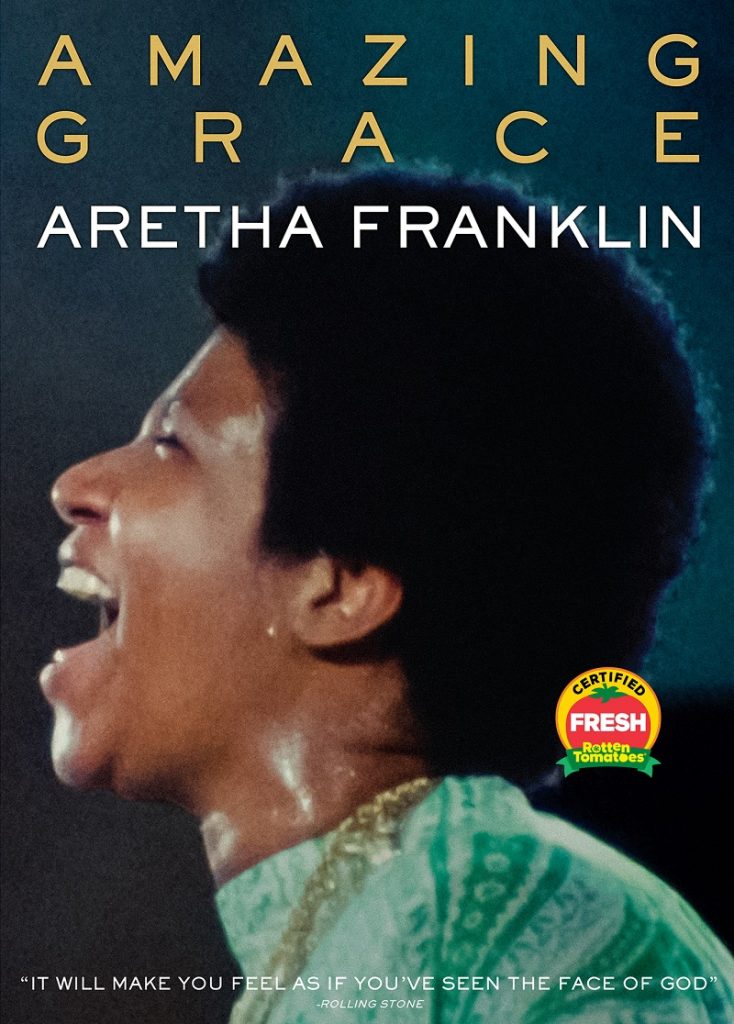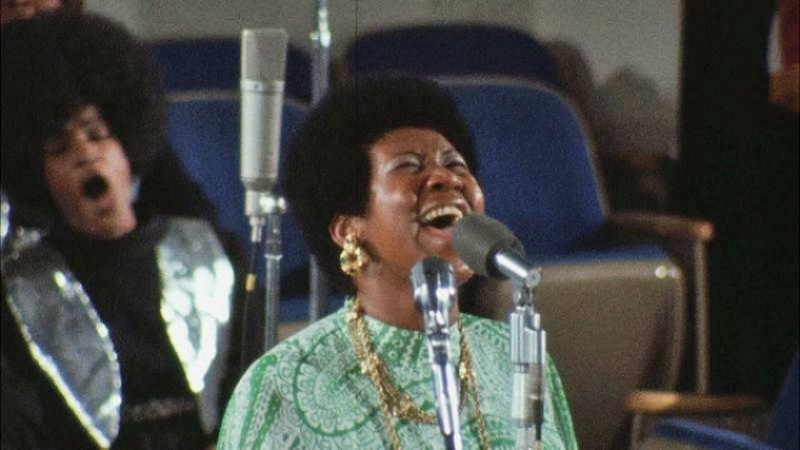There are moments in pop culture history that stand above all others. Aretha Franklin recording her gospel album at the New Temple Missionary Baptist Church in Los Angeles in January 1972 is one of them, and thanks to advancements in technology, the documentary of that two-night event recorded by filmmaker Sydney Pollack, we can all bask in a glory as if it came from God himself with the documentary Amazing Grace, now on DVD.

The best tracks from the two-night stint at the South Los Angeles church were put together and released as an album, also titled Amazing Grace. It would go on to become the highest selling gospel album of all-time. One can see why, instantaneously. The moment Franklin, who was known as the Queen of Soul, gifted the audience with her gospel-reared pipes, it was if heaven had opened and sent the most gracefully intelligent singing angel to us here on Earth. The first track, Mary, Don’t You Weep, sensationally soared up into the rafters. Pollack frames the moment in such a way that those chills that will undoubtedly permeate your body are essentially punching your ticket for a righteous journey that will change you in the best of ways. I, frankly, want to be a better person, since I was given the gift of life and live in a such a world where an Aretha Franklin exists.
Backing her up and adding layers to the Godly grace of the moment, was the Southern California Community Choir, whose leader’s (Rev. Alexander Hamilton) intimate awareness of the material guided his singers to lofty heights that they could have all only dreamed of achieving when they awoke that day.
Before a note is sang, Rev. James Cleveland (who also serves as the choir director for the SCCC) addressed the crowd and said what we all know, that Franklin, “can sing anything.” He also explained why her decision to record a gospel album in a church, versus a recording studio, gave each soul in attendance a responsibility. Thing is, he was imploring the crowd to speak out when the music or a moment touched them in any kind of way. Feel like shouting, “Amen?” Then shout it. Franklin wanted the recording to feel as organic as it would attending any church with a powerful gospel choir. Those hearing such music would hardly be silent … and there might be a whole lot of dancing in the aisles. It’s funny, in hindsight, that he felt compelled to inform the crowd of this aspect of the recording. Sure, there are cameras everywhere and microphones and their presence could make folks a little reserved. But I honestly have to say that the moment Aretha and that choir belted out any single one of the tracks, any human being would innately rise to their feet, placing your hands in the air towards the heavens and allowing the music to pulsate through your vines as if it came from God himself. It kind of did, no?!
Franklin scored with her “host” of the two evenings. Besides his uncanny ability to capture an entire room with his prose, Cleveland also is a wizard of musicality as well. He accompanied Aretha with the band on the piano and even backed her up vocally. There’s a moment in the film that might be my absolute favorite and it involves the good Reverend. During her singing the title track of the movie and the album, he must excuse himself from the piano and take a seat on the side of the stage. Cleveland was so overcome with emotion that he just broke down in sobbing tears. Pollock’s camera captures this in the most unobtrusive ways and thus allows us to finally release the emotions that have been building inside us like a geyser. Whether it’s witnessing the Grand Canyon or hearing Aretha sing Amazing Grace, those moments where God’s power and the grace of his goodness can be seen and felt, there is no other outlet than physically induced sobbing. That’s just one of many of those types of moments that permeate throughout the film. It’s a religious experience, yes, but one does not have to be spiritual to appreciate the power of the moment. Amazing Grace engulfs you in a tsunami of emotive resonance that will not be easy to recover from—nor will you want to.

The history of the documentary is a complicated one and thankfully, the technical and legal issues that surrounded it have been all ironed out. Something occurred during the second night’s recording that affected the footage. There’s a throw-away line where Cleveland thanks the audience for their patience as they figured out how to work around a piece of electronic equipment that had a glass of water accidentally poured on it. Pollack took the footage home and realized there was not much he could do with it, other than piece it together. Given the seismic musical moment that was the entire event, the helmer did not want to take anything away from it with less-than-stellar footage. As you know, the album was released, and it has sounded fantastic. In 2008, Pollack gave the footage to Alan Elliott before Pollack passed away, and instructed him to finish it, somehow and someway. It took years, but the footage was restored or worked around and months after Franklin departed this earth, it was finally released.
How special was this event? Let’s just say that when word got out that Aretha was recording a gospel album with a full gospel choir in South Los Angeles, Rolling Stones members Mick Jagger and Charlie Watts made it their mission to attend. Witnessing them bask in the glory of this transcendent moment in music history is truly special. It reinforces what the viewer already has been feeling in a few short musical numbers. Being able to experience live the return of Franklin to the music she grew up belting out alongside her legendary father’s preaching is a once in a lifetime opportunity. That’s exactly why this DVD is so important. The album is beyond compare in this musical milieu. But the visual adds emotive weight to the sonic succulence. It’s not the most riveting documentary from a filmmaking standpoint. It doesn’t need to be, not even in the slightest. All the bells and whistles one needs from a film comes pouring out of Franklin’s soul and into a microphone.
Since a time machine does not exist and the opportunity to witness Aretha is sadly gone with her passing, there is no better gift for yourself—or anyone you care about—than the Amazing Grace DVD. It is a cliché, but could not be truer in this situation, this documentary is absolutely the gift that gives and gives exponentially until the end of your time on earth.
Grade: A+

